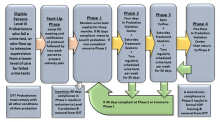Interventions that apply deterrence through the principles of certain apprehension and swift response using graduated sanctions and incentives have shown promise in reducing relapse, violations and recidivism among drug-users who commit offenses.
The Delaware Department of Correction's (DOC's) Decide Your Time protocol is based on these principles. With funding from the Office of National Drug Control Policy (ONDCP), NIJ awarded a grant to the University of Delaware to conduct a field experiment.
The purpose of NIJ's field experiment is to inform and improve criminal justice and public health policy and practice regarding relapse, violations and recidivism among chronic drug-users who commit offenses in the community.
Upon completion of the evaluation, the program was rated No Effects by NIJ’s CrimeSolutions. The program was shown to have no impact on the successful completion of probation, on re-arrests, or on drug use. Specifically:
- At the 18-month follow up, researchers found no statistically significant difference in the successful completion of probation between the Decide Your Time group and the comparison group.
- The program did not have a statistically significant impact on arrest rates of participants, compared with those in the comparison group.
- The program did not have a statistically significant impact on participant drug use, when compared with those in the comparison group.
Learn more about the program rating from the CrimeSolutions program profile.
Decide Your Time Protocol
The Decide Your Time Protocol is for persons who commit serious offenses serving intensive supervision sentences under probation or parole. The protocol was developed by the Delaware DOC based on past research projects with the University of Delaware, such as the Step'n Out behavioral management program for persons on parole.
Protocol Eligibility — Persons convicted of a crime under intensive supervision are placed into the protocol after they fail their first urine test. Convicted persons who originally were sentenced to less intensive supervision but have been placed under intensive supervision because of a failed urine test are also eligible.
Drug Testing — Initially, urine tests are administered on a random basis, averaging once per week. If results are positive, then the schedule is increased to two regular tests per week. Testing negative for 90 days is a requirement for transition to less intensive supervision. In addition to monitoring drug use, testing is used as a motivational tool — more tests are perceived as a sanction, and fewer tests as a reward.
Sanctions and Incentives —
The protocol applies graduated sanctions and incentives to motivate behavior change. At protocol intake, convicted persons are provided protocol information and an explanation of how their drug use is linked to protocol phases. Continued drug use progressively leads to mandated treatment, more frequent testing, curfew and incarceration sanctions. Abstinence leads to removal of these sanctions; the ultimate incentive for continued abstinence is reclassification to standard community supervision.
A person convicted of a crime who remains drug free transition to less intensive levels of supervision, allowing resources to be redistributed to those in need. Those who do not remain drug free are reassessed for treatment and other service needs. Outpatient treatment is mandated after repeated positive drug tests. Depending on clinical need, treatment modalities including long-term residential services are available. Persons on probation who are compliant at any phase for 30 days move back to the initial level of supervision. A person convicted of a crime at the initial level of supervision who are successful for 30 days move to the lowest level of supervision. At any phase, officers can violate probation or parole for cause.


